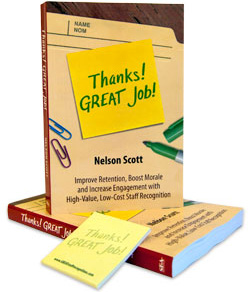Staff recognition tips & techniques
10 Top Ideas from Recognition Conference
The challenge when we return from conferences and conventions is to sift through the pages of notes we took while listening to keynoters and attending breakout sessions to find those few keepers that we will implement or share with others.
When I returned from the 2010 conference of Recognition Professionals International, which was held in late April at the Green Valley Ranch in Henderson, Nevada, I challenged myself to select 10 ideas that could easily be applied to other organizations to share with Briefly Noted readers. Here is my RPI Top 10 for 2010:
- Recognition can help organizations achieve their corporate goals. At Delta Airlines, one goal is to win a JD Power award for customer service. “We want to use recognition to get there,” Stephanie Merchiore said during her opening keynote presentation. “If we treat staff well, they will treat customers well.” Kimberly Abel and Robbie Robbie of Diamond H Recognition said that employees who feel appreciated are more likely to provide better customer service and be more productive. Ann Foley of Metlife Home and Auto said her company wants to create “an environment where all associates feel valued and the behaviours that drive business get recognized and rewarded”. At her company, there are four, easy-to-remembers reasons that staff are recognized: customer focus, teamwork, leadership and results.
- Recognition needs to be culturally sensitive. Whether yours is an organization that operates in 72 countries, as Delta Airlines does, or a local company with a workforce that reflects Canada’s diversity, recognition needs to be culturally appropriate to be valued by recipients.
- Recognition can support change. Dr. Carol Pletcher, co-founder of the Global Center for Recognition, explained that staff members are more likely to support an organization’s efforts to change if recognition is tied to behaviours that support the change.
- Customers can be enlisted to contribute to recognition efforts. Members of the top tiers of the Delta Airline’s frequent flyer program—the people who should know best what superior service look like—are given “A Job Well Done” certificates that they can present to employees who provide exceptional service. Employees may then exchange these certificates for points that can be redeemed for awards in Delta’s program.
- Recruit recognition champions. At Metlife Auto and Home, and at Ohio State University Health Center, recognition champions spread the recognition message in their departments, ensure that tools of recognition are in place, and encourage day-to-day recognition.
- Recognition must remain current. Programs and processes that are no longer working need to be retired. At Ohio State University Health Center, they went beyond just retiring the old programs, Amy Hurley said. Funerals were held for programs that were no longer going to be used.
- Managers can make or break your recognition efforts, said Kimberly Abel and Robbie Floyd of Diamond H Recognition. They feel that the ability to recognize staff should be seen as a leadership competency.
- Recognition can help answer employees’ key questions, said Kimberly and Robbie, such as:
• What do you want me to do?
• How do I do it?
• How am I doing?
• What’s in it for me?
In addition to helping answer these questions, recognition can also increase employees’ engagement and motivation and make them feel values and appreciated.
- Recognition increases commitment, which has benefits for supervisors and the company. Commitment leads to loyalty to the organization, which reduces turnover and increases the likelihood that staff will refer family and friends to the organization, said Kimberly and Robbie. These referrals can reduce recruitment costs.
- Appreciation is often felt, but too seldom expressed. During the presentation that closed the convention, author Judith Umlas (The Power of Acknowledgement) posed a question that we should all ponder: “How many thoughts of acknowledgement pass through are brains, but are never expressed?”
For more information on RPI visit www.recognition.org.
[Return to staff recognition tips & techniques articles index]
[Return to Articles Index]
[Back to top]
|
  


|




